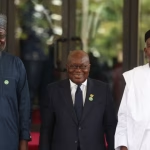AJACCIO, Corsica —
Pope Francis made his historic first papal visit to the French island of Corsica on Sunday, calling for a dynamic form of laicism that bridges religious and civic life. During his one-day trip, which coincided with his upcoming 88th birthday, the pope emphasized the unique role of popular piety on the island, which distinguishes it from secular France.
Despite a recent fall that left him with a faint bruise, Pope Francis appeared energized and engaged throughout the visit. During Mass at La Place d’Austerlitz, an outdoor venue, he deviated from his prepared remarks, commenting on the abundance of children present in Corsica, joking that he had only seen more children in East Timor during his recent Asian tour. “Make children,” he urged the crowd, “They will be your joy and your consolation in the future.”
Earlier, during the closing of a Mediterranean conference on popular piety, the pope spoke about a secularity that is evolving and dynamic, rather than fixed, and one that fosters cooperation between civil and ecclesial authorities. He praised expressions of popular piety, such as processions and communal prayer of the Holy Rosary, for nurturing constructive citizenship among Christians. At the same time, he warned against reducing these traditions to mere folklore or superstition.
The brief visit to Corsica’s capital, Ajaccio — the birthplace of Napoleon Bonaparte — lasted just under nine hours, making it one of the shortest foreign trips of his papacy. In addition to attending the conference, Pope Francis met with French President Emmanuel Macron for about 40 minutes. The pope was accompanied by Cardinal François-Xavier Bustillo, the bishop of Ajaccio, who helped organize the conference, which brought together 400 participants from Spain, Sicily, Sardinia, and southern France. The two-day event focused on faith expressions outside of formal liturgies, such as pilgrimages and processions.
Corsica’s unique devotion to popular piety includes the cult of the Virgin Mary, known as the «Madunnuccia,» who is credited with protecting the island from the plague in 1656. The island, which was under Genoa’s control at the time, now cherishes these deep-rooted traditions.
Pope Francis was warmly received by the island’s residents, with children in traditional garb greeting him, while bands and choruses serenaded him along the motorcade route. Thousands of people gathered along the streets and from windows to catch a glimpse of the pontiff. Renè Colombani, who traveled by ship with 2,000 others from northern Corsica, remarked, «It is an event that we will not see again in several years. It may be the only time that the pope will come to Corsica.»
After the conference, the pope visited the 17th-century Cathedral of Santa Maria Assunta to meet with clergy. Along the way, he stopped at the statue of the Madunnuccia to light a devotional candle.
The Mass was celebrated beneath a towering statue of Napoleon Bonaparte, a poignant symbol of the island’s complex history. Napoleon, the French emperor who annexed the Papal States in 1808, had two of Pope Francis’ predecessors, Popes Pius VI and VII, imprisoned. Napoleon was excommunicated and eventually defeated in battle.
Before leaving, Pope Francis had a private meeting with President Macron at the airport, where they were expected to discuss global issues such as the ongoing wars in the Middle East and Ukraine, as well as climate and environmental concerns, according to Macron’s office.
Interestingly, Pope Francis chose not to attend the recent reopening of the Notre Dame Cathedral in Paris following its restoration from a devastating fire in 2019. His visit to Corsica, focused on the island’s rich spiritual traditions, seemed more aligned with his papacy’s emphasis on engaging with the «church of the peripheries.»
This marks the pope’s third visit to France, with previous trips in 2014 to Strasbourg and in 2023 to the port of Marseille. On each occasion, he has avoided the formalities of a state visit in Paris, preferring to focus on local communities and less conventional settings.
Descubre más desde Polimatía TemisEdu
Suscríbete y recibe las últimas entradas en tu correo electrónico.

